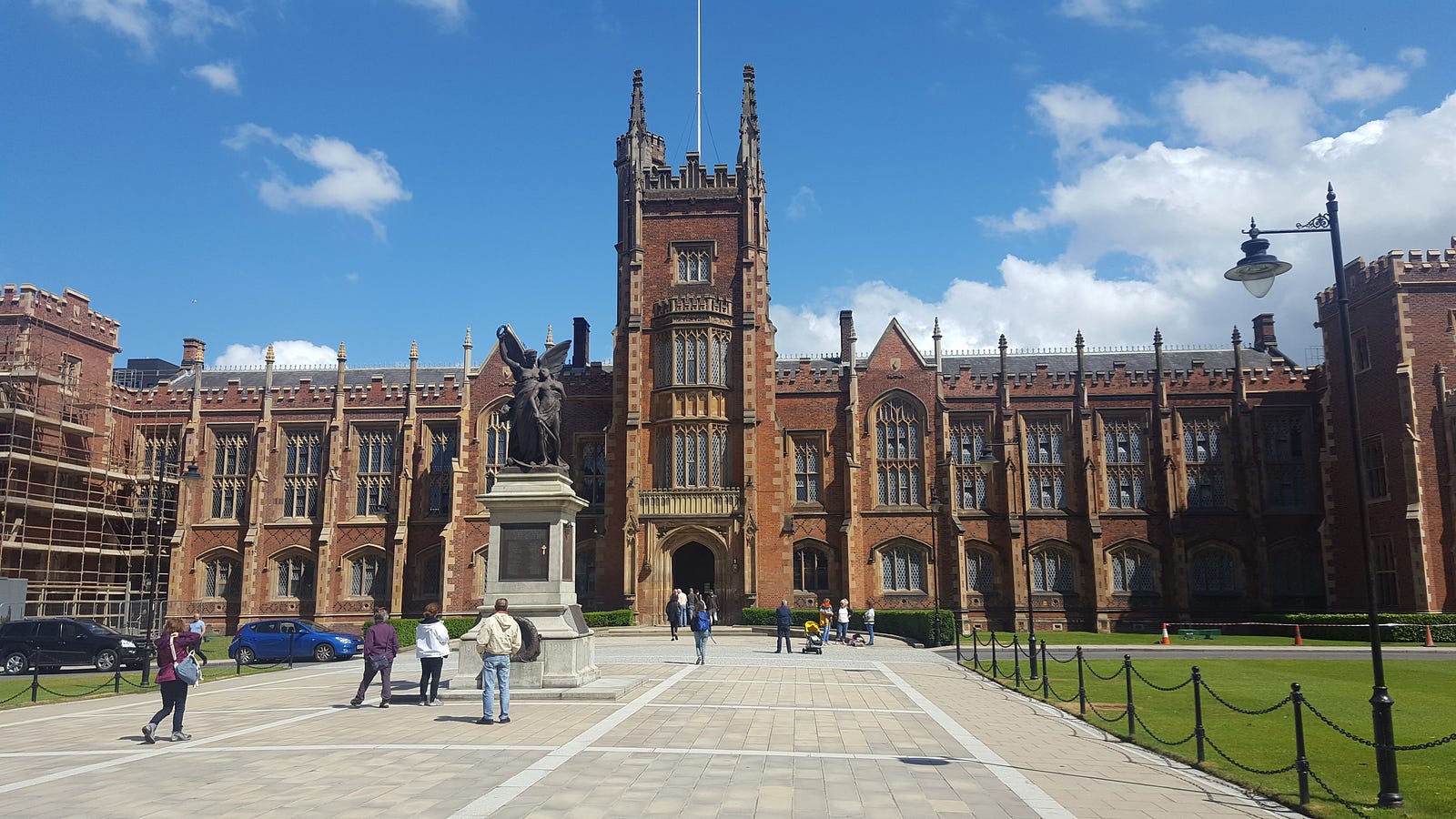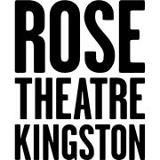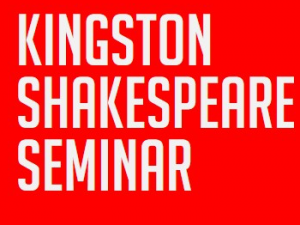Ben Broadribb on the Belfast BSA Conference
21st June 2018
This post originally appeared on medium.com, and is reproduced here with the kind permission of its author. Thanks, Ben!
10 Things I (Most Definitely Didn’t) Hate About BSA Belfast 2018
So, a short preamble, as this is my very first entry here. My name’s Ben Broadribb, and I’m currently at around the halfway point of a part-time PhD in Shakespeare Studies at the Shakespeare Institute (which means I’ve already done three years, and, all being well, I have another three to go). I was once a regular blogger, although this has become considerably more sporadic in recent years as other commitments have inevitably swallowed up my time. I’ve wanted to get back into blogging for a while and create somewhere to write down anything I want to say related to my research, but which doesn’t quite fit into my thesis. Enter this blog — and indeed, this first entry.

The British Shakespeare Association held their biennial-until-next-year-when-it-becomes-annual conference at Queen’s University in Belfast last week. The conference ran from Thursday 14th to Sunday 17th June 2018, and I was lucky enough to attend for the entirety of the four days. So, in no particular order, and in a loose tribute to an enduring teen screen Shakespeare favourite, here are my ten things I loved about everyone and everything at BSA Belfast:
- The welcoming atmosphere
This was my first BSA conference, as well as my first ‘big’ academic conference. It’s fair to say that, whilst very excited to attend, I was also quite nervous and a little unsure of what to expect. It almost goes without saying that I needn’t have been worried: from the moment I arrived, the conference was characterised by a genuinely warm and convivial vibe from the organisers and attendees alike. The importance of this can’t be understated for someone like me, a first-timer still finding their feet in academia when entering a room of highly-respected names from around the world. - The sense of equality
This follows on from the first point, but deserves its own entry on this list. It was incredibly heartening to find myself amongst seasoned doctors, professors, academics and practitioners, and to see me and my fellow PhD researchers be continuously treated as equals. In every conversation I was part of or party to, those who have worked their way to the top of the academic tree were genuinely eager to hear about and support the work of those of us at the start of our journey. Just wonderful. - The first session
The supportive atmosphere was instigated from the get-go thanks to a workshop entitled Getting Your Research Out There, which offered invaluable advice and guidance about turning a thesis into a book, chapters for edited collections, articles and ‘pivots’ (longer than an article, shorter than a monograph). There were also some brilliant tips for getting paper abstracts accepted for conferences from Eoin Price — particularly helpful as he’s heading up the organisation of next year’s BSA conference in Swansea. - The food
Corinne Furness, my fellow SI doctoral researcher who chaired this year’s British Graduate Shakespeare Conference (or BritGrad to its friends), wisely made the observation to me earlier this year that getting the food arrangements right at a conference is a big deal — people remember if they ate well, but they also don’t forget if they didn’t! BSA Belfast definitely got this right, from the wine and canapés reception on the first evening to the fantastic celebratory dinner at Titanic Belfast. - The online conference
The generous, detailed and heartfelt interaction between many BSA participants on Twitter using the #BSABelfast18 hashtag meant a second fascinating layer of the conference was continuously happening online. It was also lovely to put faces to online aliases, meeting so many people in person after first interacting with them over Twitter before and during the conference. If you were ever in doubt that social media really can be an incredibly positive force, just ask anyone who tweeted during the conference. A special tip of the hat to those who live-tweeted so much of the four days — it’s a skill I know I will never have, so I bow down before your expert concision and pollical prowess! - The papers
Listening to fellow PhD students speak about their research is something I’ve enjoyed the most since becoming part of the postgraduate community. This was no different at BSA Belfast, with each panel I attended offering the chance to hear researchers from across the globe speak on a huge range of topics with infectious enthusiasm. With up to nine panels scheduled at once, there were some very tough decisions to make on which papers to hear, but thanks to the Twitterspeareans mentioned above a great many speakers had the essence of their presentations captured online for those who missed out. Special thanks to those who came to hear my paper on Saturday afternoon, and also to those who presented alongside me — I really enjoyed the whole experience! - The seminars
As this was the first year seminar sessions ran at a BSA conference, they’re likely to have been a new experience for quite a few conference attendees, including me. The decision between attending Shakespeare on Film and Shakespeare, Performance and the 21st Century, both of which had oodles to offer me in relation to my research, was undoubtedly the most difficult programme choice I had to make. I ultimately plumped for the former and was happy with my choice, although I genuinely wish I could have somehow bent the laws of time and space been at both! The discussions between those who had submitted papers for circulation at the seminar was fascinating, lively and respectful, even when opposing views were being argued. Taking part looked daunting as an auditor observing; but the opportunity to take part in an extended discussion with both doctoral researchers and experienced academics would be invaluable, so I’m eager to take part in a seminar session myself at a future conference. - The plenaries
I’m still a conference newbie, but I already know that not every plenary session will speak to my direct research interests, and that these can at times feel less engaging. Not so at BSA Belfast: the conference had superb plenaries closely linked to my research from Courtney Lehmann and Pascale Aebischer; but honestly, every plenary had me utterly enthralled. Two highlights out of a flawless programme were Ayanna Thompson’s mesmerising analysis of Deutsches Theater Berlin’s extraordinary (in every sense) production of Othello, and Richard Dutton’s enigmatic masterclass examining the original casting of the early modern play The Second Part Of The Seven Deadly Sins. - The films
Unsurprisingly considering my mild obsession with film and Shakespeare, the opportunity to see premiere UK screenings of recent Shakespearean films was a particular highlight of the conference for me. Veeram offered a vibrant and aestheticised Indian adaptation of Macbeth on Saturday afternoon. Before that, however, Hermia & Helena provided a less straightforward, at times surreal appropriation of A Midsummer Night’s Dream. A fascinating discussion with director Matías Piñeiro straight afterwards offered some extra insight into the filmmaker’s process, as well as covering such topics as the other Shakespeare plays he’d like to adapt, and why he’s not so keen on Woody Allen’s back catalogue. Mia Hewitt also deserves a special mention for her flawless hosting of the Q&A session with Piñeiro. - The memories
Okay, a bit of an intentionally vague tenth reason to allow me to mention anything else I haven’t already. Deal with it: my blog, my rules.
In all seriousness, the invaluable memories of my time at BSA Belfast will stay with me for a long, long time. I can’t overstate the importance to me personally to have been afforded such wonderful opportunities to support, interact and socialise with so many people from the global Shakespeare community. As a part-time researcher who returned to higher education after several years away, and who doesn’t live close to my institute of study, I still sometimes feel — or perhaps, more accurately, convince myself — that I’m something of an interloper in the academic community. My time at the BSA conference steadfastly proved to me that this isn’t the case (well duh!), gifting me with a priceless uninterrupted few days to forge new friendships and allow existing ones to be further cemented. I know in my heart that I made some friends for life during the few days I spent in Belfast. The only thing that could have been better? Winning the pub quiz on Thursday night instead of coming second. If only we’d played our Joker on the Film & TV round as originally planned…
A huge thank-you once again to everyone at Queen’s University Belfast who made the 2018 British Shakespeare Conference the incredible success that it was, and particularly to conference organiser Dr. Ramona Wray.






